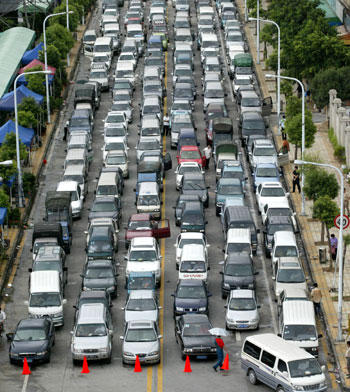San Francisco: Progressive Paradise or Bankrupt Banana Republic?
Great article in the SF Weekly on San Francisco: The Worst Run Big City in the US. The article is lengthy and packed full of government fail. Just one example:
You can't get San Francisco running efficiently, because that would require large numbers of unionized city workers to willingly admit their redundancy and wastefulness. Inefficiency pays their salaries. "It's been going on for decades," Peskin says.
This problem comes up almost every time the city negotiates labor contracts, which is part of the reason San Francisco is constantly on the brink of fiscal ruin. Politically powerful unions "” the progressives are beholden to the service unions; moderates cater to police, firefighters, and building trades; and Republicans ... what's a Republican? "” negotiate contracts the city knows it can't afford. Politicians approve them, despite needing to balance the budget every year, because the budget impact of proposed contracts is examined by the Board of Supervisors only for the following year, no matter how long contracts run. According to former city controller Ed Harrington, it has become common practice not to schedule any raises for the first year of a contract, but to provide extensive raises in later years.
The result is a contract that looks affordable one year out, then blows up in the city's face. City employees receive up to 90 percent of their already generous salaries in pensions and many also receive lifetime health care "” meaning that as they retire, labor costs soar.
Sounds like the health care bill in Congress, no? The bit near the beginning on the problem in the parks department - overstaffing, no one showing up for work, lost money, poor controls, no process - particularly resonate with me. My business is the privatization of public parks. I can't tell you how many public parks agencies I know to be providing terrible service (service levels that I would be ashamed of) with grossly inflated budgets tell me face-to-face that they can't privatize because that would jeopardize the quality of the parks. Well, that and the fact that the public employees unions would not allow it.
I always laugh when folks tell me that government intervention is needed because private industry is too short term oriented. But no one is more short term oriented than politicians looking to the next election or closing this year's budget hole. In particular, capital maintenance is always ignored until infrastructure is literally falling apart. We see it in parks, transit systems, roads, schools, etc. It is the same phenomenon that causes third world state-run oil companies to have their production fall off - instead of reinvesting their profits into upgrades and maintenace of their fields and infrastructure (as those short-term focused American oil companies do) they transfer the money into social giveaways that cement their political power. Here is a great example from San Francisco:
In 2002, the San Francisco Chronicle revealed that the city had, for decades, been siphoning nearly $700 million from its Hetch Hetchy water system into the San Francisco General Fund instead of maintaining the aging aqueduct. Several mayors and boards of supervisors used that money to fund pet causes, and the Public Utilities Commission didn't say no. Unfortunately, spending maintenance money elsewhere doesn't diminish the need for maintenance. By 2002, the water system was in such desperate condition that voters were asked to pass a $3.6 billion bond measure to make overdue fixes. Obligingly, they did "” who doesn't like water? Since then, the projected costs have swelled by $1 billion. So far.
My favorite line:
"San Francisco is Disneyland for adults, or a place people go until they grow up."
